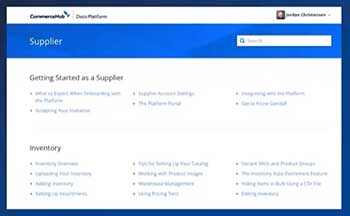Electronic data interchange (EDI) platforms like SPS Commerce and CommerceHub play a vital role in seamlessly connecting retailers, suppliers, and trading partners. With omni-channel shopping growing exponentially, retailers must efficiently manage complex supply chain logistics to deliver a unified customer experience across all channels. This is where EDI solutions come into play.
But how exactly do SPS Commerce and CommerceHub compare when it comes to enabling retail EDI? What are the key strengths and weaknesses of each platform?
This article will provide a comprehensive overview of the pros and cons of SPS Commerce and CommerceHub to help you determine the best EDI provider for your retail business.
A Brief Comparison Table
| Aspects | SPS Commerce | CommerceHub |
| Best For | Suppliers | Retailers |
| Key Focus | EDI, OMS | Drop ship enablement |
| Trading Partner Size | Mid-market to large | Mainly large enterprises |
| Platform Scope | End-to-end solution | Specialized capabilities |
| Customization | Highly customizable | Configuration-based |
| Learning Curve | Steep | Low |
| Pricing Model | Transaction-based | Volume-based |
| Strengths | Robust OMS and analytics | Rapid onboarding, supplier network |
| Limitations | Complex and costly | Limited supplier OMS capabilities |
Overview Of SPS Commerce
SPS Commerce is one of the leading retail EDI and supply chain management solution providers. It offers a cloud-based EDI platform and order management system built specifically for retail suppliers, logistics providers, and grocers.
Key Features and Benefits

- EDI translation services – SPS Commerce supports over 90,000 pre-configured trading partner maps for seamless EDI integration. It can translate data into the required format for different retailers.
- Order management system – The SPS Commerce OMS provides a central hub to manage orders from all channels including EDI, web, and mobile. Suppliers get real-time visibility into order status across the entire fulfillment life cycle.
- Inventory management – Suppliers can leverage SPS Commerce to share inventory data with retailers and get visibility into real-time stock levels across the supply chain. This allows for proactive inventory planning and replenishment.
- ** Analytics** – Robust analytics and reporting provide insights into supplier KPIs such as fill rates, lead times, and more to drive performance improvement.
- EDI compliance – SPS Commerce ensures compliance with all EDI standards and mandates from different retailer trading partners.
- Trading partner community – SPS Commerce has one of the largest trading partner networks in retail with over 90,000 connections. Suppliers can seamlessly connect with new retailers.
- Retailer integrations – Pre-built integrations with major retailers like Walmart, Target, Home Depot, Best Buy, etc. make it easy to get started with new EDI retail relationships.
When Does SPS Commerce Work Best?
SPS Commerce works best for:
- Mid-market to large suppliers serving multiple retailers
- Suppliers that require advanced order management capabilities
- Brands looking for an end-to-end solution spanning EDI to OMS
- Companies with complex omni-channel order fulfillment needs
- Businesses that want analytics-driven insights into retail performance
However, SPS Commerce may be overkill for small suppliers working with only one or two retail trading partners.
Overview Of CommerceHub
cprovides a cloud-based EDI and drop ship enablement platform designed for retailers, suppliers, and emerging ecommerce companies.
Key Features and Benefits

- EDI integration – CommerceHub simplifies EDI onboarding with pre-configured document templates for major retailers. It supports seamless data exchange across purchase orders, invoices, inventory data and more.
- Drop ship automation – Automate complex drop shipping workflows between retailers and suppliers. This includes purchase order distribution, accepted/rejected order management and shipment status updates.
- Product catalogue management – Easily manage and syndicate product catalogues across multiple sales channels and trading partners. Keep product data in sync across all networks.
- Multichannel order management – Unify order management across channels like online marketplaces, websites, EDI and API. Optimize fulfilment from any inventory source.
- Analytics – Get data-driven insights into supplier performance and end consumer behaviour through the CommerceHub CInsights dashboard. Identify growth opportunities.
- Supplier network – CommerceHub provides access to a network of 11,000+ verified drop ship vendors across key retail categories. Easily find and connect new suppliers.
- Quick implementation – CommerceHub focuses on enabling rapid onboarding and time-to-value through configuration Vs. customization. New trading partners can be activated within days or weeks.
Also Read: Comparison Between Fictiv And Xometry.
When Does CommerceHub Work Best?
CommerceHub is ideal for:
- Large retailers looking to streamline complex drop shipping at scale
- Pure-play ecommerce retailers that need to rapidly expand supplier network
- Businesses focused on drop ship enablement and multi-channel order management
- Companies wanting supplier performance analytics
- Organizations that value speed of implementation over customization
However, CommerceHub may not be the best fit for suppliers working with only one or two large retailers via EDI. Also watch this video!
Frequently Asked Questions (FAQ)
Yes, CommerceHub does offer robust EDI capabilities as part of its broader drop ship enablement platform. It provides seamless EDI integration between retailers and suppliers for key documents like purchase orders, invoices, inventory data and more.
The main competitors of SPS Commerce include:
TrueCommerce, IBM Sterling, DiCentral, Cleo, B2BGateway, Boomi, GoEBT.
These platforms provide similar EDI, OMS, and retail-focused supply chain management capabilities.
SPS Commerce is primarily used by suppliers for:
Managing EDI with large retail trading partners
Omni-channel order management
Inventory synchronization across the retail supply chain
Generating analytics on supplier operations and performance
Achieving compliance with various retailer EDI standards
The CommerceHub platform is used predominantly by large retailers for:
Automating complex drop shipping workflows
Connecting to a vast supplier network for drop shipping
Managing multi-channel orders from websites, marketplaces and stores
Generating insights through supplier performance analytics
Accelerating EDI onboarding with new suppliers
Also Read: Comparison Between ServPro And ServiceMaster.
The Verdict
Based on this comparison, we can see that SPS Commerce is more geared towards suppliers while CommerceHub caters more to large retailers. SPS Commerce offers an end-to-end platform but requires heavy customization. CommerceHub is focused on drop shipping at scale and values speed of implementation.
Ultimately, the best platform depends on your specific business needs and priorities. Large retailers favor CommerceHub for its drop ship expertise and rapid onboarding. Suppliers gravitate towards SPS Commerce for its robust order management and analytics capabilities. Smaller businesses may prefer simpler EDI solutions over these enterprise platforms.
In summary, SPS Commerce and CommerceHub cater to different users with unique priorities. Retailers favor CommerceHub for its drop ship expertise while suppliers prefer SPS Commerce for robust EDI and OMS.
The best fit depends on your business needs and scale. For large enterprises, these platforms can streamline complex omni-channel operations. But for smaller businesses, they may be overkill compared to simpler EDI solutions.
